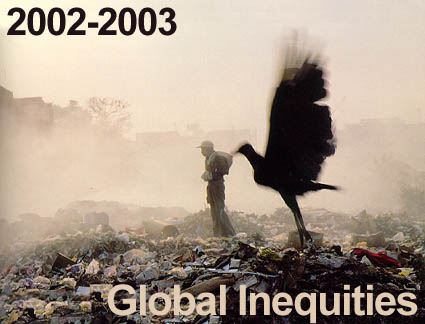- About this Program
- 2012 Conflict in the 21st Century
- 2011 Our Nuclear Age: Peril and Promise
- 2010 South Asia: Conflict, Culture Complexity, and Change
- 2009 Cities: Forging an Urban Future
- 2008 Global Poverty and Inequality
- 2007 Global Crises: Governance and Intervention
- 2006 The Politics of Fear
- 2005 Oil and Water
- 2004 Dilemmas of Empire and Nation Building
- 2003 Sovereignty and Intervention
- 2002 Global Inequities
- Class
- International Symposium
- Special Programs
- 2001 Race and Ethniciity: A Global Inquiry
- 2000 Global Games: Sports, Politics, and Society
- Symposium
- 1999 Global Crime, Corruption, and Accountability
- 1998 Exodus and Exile: Refugees, Migration, and Global Security
- 1997 The Future of Democracy
- 1996 Religion, Politics, and Society
- 1995 20/20 Visions of the Future
- 1994 Ethnicity, Religion and Nationalism
- 1993 Transformations in the Global Economy
- 1992 - International Security: The Environmental Dimension
- 1991 Confronting Political and Social Evil
- 1990 The Militarization of the Third World
- 1989 Drugs, International Security and U.S. Public Policy
- 1988 Foreign Policy Imperatives for the Next Presidency
- 1988 Covert Action and Democracy
- 1987 The West Bank and Gaza Strip
- 1986 International Terrorism
- News
- Press Clips
- Calendar
- Resources
EPIIC Archives
2002 Global Inequities

|
|
If the Earth's population were conceptualized as a village of 100 people, keeping all the existing human ratios the same, 6 people would possess 60 percent of the entire world's wealth, 80 would be in substandard housing, 50 would suffer from malnutrition, 1 would be near death, 2 near birth; 70 would be unable to read , and only 1 would have a college education. (The World Paper)
- More than 1.2 billion of the world's 6 billion people live on less than US$1 dollar a day, and another 2.8 billion on less than US$2 dollars per day. The number of people living in absolute poverty is increasing by nearly 25 million a year.
- More than 25 percent of the children in the U.S. under the age of six live in poverty.
- Approximately 90 percent of HIV infections occur in developing countries.
- The wealthiest fifth of the world's people consume 86% of all goods and services, while the poorest fifth consumes one percent.
Exploring the relationship between globalization and inequality, this symposium will probe the complex forces driving the integration of ideas, people and economies worldwide. This inquiry into global disparities will consider the challenges of global governance, societal and economic norms, and the imperatives of economic and social justice. We will examine dilemmas of social stratification: class, race and gender; poverty; functional democracy; civil society; and competing visions of citizenship. Thinking about the relatedness of freedom, development, and sustainability, we will consider the realities of sovereignty, power and powerlessness. We will probe the complexities of growth, poverty reduction, corruption, and the roles of international organizations such as the World Trade Organization, the International Monetary Fund and the World Bank. We will investigate the global impact of multinational corporations and their accountability and transparency and the impact of fast track trade authority on labor and environmental concerns.
From Brazil to the U.S., from India to South Africa , from Nigeria to China, we will look at issues of education, environmental degradation, debt relief, land distribution, resource allocation, extractive industries, labor practices and standards, the new slavery, genomics, intellectual property and patenting, and the political economy of civil wars...
Of special concern throughout will be the development of human security strategies to reduce inequalities and address marginalization and disenfranchised populations.
Sources: UNDP, Center for Budget and Policy Priorities; FAO, UN, UNDP, World Bank

